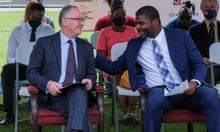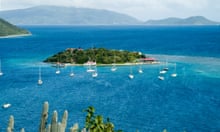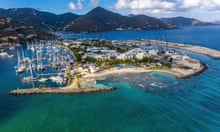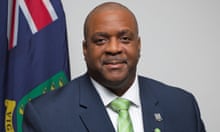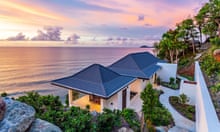Sir Richard Branson has said he will mortgage his private Caribbean island to raise money to help his Virgin Group empire, as he pleaded with the UK government to step in and save his Virgin Atlantic airline from collapse.
Branson, who is the UK’s seventh richest person with an estimated £4.7bn fortune, and has lived tax-free on Necker Island in the British Virgin Islands for the last 14 years, promised in a public blogpost on Monday that he would “raise as much money against the island as possible to save as many jobs as possible”.
Branson, 69, made the pledge as he tried to convince the government to give his airline a £500m loan to help it through the “devastating impact this pandemic continues to have”.
“The reality of this unprecedented crisis is that many airlines around the world need government support and many have already received it,” he said. “We will do everything we can to keep the airline going – but we will need government support to achieve that in the face of the severe uncertainty surrounding travel today and not knowing how long the planes will be grounded for.”
Branson is facing mounting criticism for seeking financial assistance from the taxpayer, rather than using his own fortune to rescue the airline. Many pointed out that the entrepreneur has paid the exchequer no personal income tax since moving to the tax-free British Virgin Islands 14 years ago.
The former shadow chancellor John McDonnell told the Guardian this month it was unacceptable that “rich billionaires [were] milking the system” at a time of national crisis.
Diane Abbott, the MP for Hackney North and former shadow home secretary, said on Monday: “Branson has not paid tax in this country for 14 years. On no account should he get a taxpayer bailout, loan or otherwise.”
Branson has not paid tax in this country for 14 years. On no account should he get a taxpayer bailout, loan or otherwise #virginatlantic https://t.co/MEHj6EAFB7
— Diane Abbott MP (@HackneyAbbott) April 20, 2020
Branson’s fresh plea for taxpayer support comes after the government rejected Virgin Atlantic’s initial proposal for a £500m aid package. The Treasury rejected the proposal, and told Virgin to explore other ways to raise cash before seeking state assistance.
An open letter to Virgin employees https://t.co/Nv1RLBhp3j pic.twitter.com/Qj16CUT5N0
— Richard Branson (@richardbranson) April 20, 2020
Branson said he was asking for a taxpayer loan, not a handout: “This would be in the form of a commercial loan – it wouldn’t be free money and the airline would pay it back.”
An open letter to our Virgin family. For 50 years I have been humbled by the incredible pride our people take in working for Virgin. Here are the facts about Virgin businesses: https://t.co/Nv1RLBhp3j pic.twitter.com/BneE0mZ0Zg
— Richard Branson (@richardbranson) April 20, 2020
He dismissed the idea that he should consider tapping into his vast personal wealth rather seeking government support.
“I’ve seen lots of comments about my net worth – but that is calculated on the value of Virgin businesses around the world before this crisis, not sitting as cash in a bank account ready to withdraw,” he said.
The billionaire later confirmed that he is not offering Necker Island as collateral on loans from the UK taxpayer, but only as security against commercial loans.
“He and the team at Virgin Group will use the resources available to them which could even include raising money against Necker,” his spokesperson said. “He does not state that Necker Island would be used as collateral against any potential government support Virgin Atlantic may receive.”
Branson has pledged to inject $250m (£197m) into Virgin Group, his empire which stretches from planes and trains to health clubs and spaceships, and which employs about 70,000 people. The pledge – of which $100m is thought to be earmarked for the airline – is 5% of his fortune.
Branson is the 268th richest person in the world with an estimated $5.9bn paper fortune, according to the Bloomberg billionaires index. Branson founded Virgin Atlantic in 1984 and retains a 51% stake, alongside the US airline Delta with 49%.
On Monday, Branson said he and his wife, Joan, “did not leave Britain for tax reasons but for our love of the beautiful British Virgin Islands and in particular Necker Island.
“Over time, we built our family home here. The rest of the island is run as a business, which employs 175 people. As with other Virgin assets, our team will raise as much money against the island as possible to save as many jobs as possible around the group.”
Branson also sought to defend Virgin’s decision to sue the NHS after his Virgin Care company lost a £82m contract to provide children’s health services across Surrey. NHS Trusts paid out an undisclosed amount.
“Virgin Care was never intending to profit from it and 100% of the money awarded went straight back into the NHS,” he said. “If Virgin Care ever does make a profit, we have committed to reinvest 100% of that back into the NHS.”
PR Posturing: Sir Richard Branson with £4.7bn fortune says he will put his private Caribbean island up as a collateral to persuade the UK govt to save his Virgin Atlantic airline.
— Prem Sikka (@premnsikka) April 20, 2020
If he can do that he can borrow commercially and does not need govt money.https://t.co/OcbIH1ZFXV
Fiona Nicholls, a climate campaigner for Greenpeace UK, said: “Richard Branson’s letter failed to convince us that suing the NHS wasn’t bad for the health service, moving his money to a tax haven wasn’t to avoid tax, or that emitting millions of tonnes of pollution wasn’t bad for the environment. There are still no justified grounds to give Virgin an unconditional bailout. Public money should be used for public goods.”
Branson has the backing of bosses at Airbus, which makes Virgin Atlantic’s planes, and Rolls-Royce, which makes its jet engines, who have warned ministers that if the airline collapsed, it could drag them down too.
The chief executive of Manchester Airports Group, Charlie Cornish, wrote to the chancellor, Rishi Sunak, calling on the government to step in and support the airline. He said Virgin flights were “directly benefiting the economies of Manchester and the surrounding region”.
Virgin Australia, the country’s second-biggest airline, is on the brink of collapse after it failed in its attempt to secure a AU$1.4bn (£715m) bailout from the Australian government. The airline, which is 10% owned by Virgin Group, is expected to appoint administrators as soon as Tuesday.

